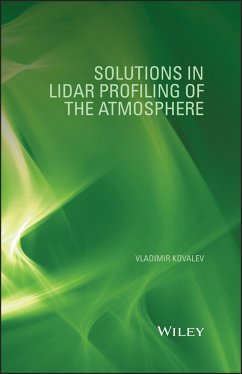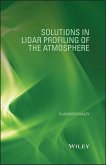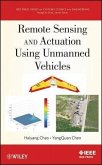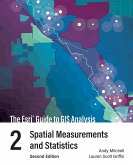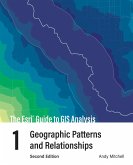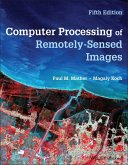Vladimir A. Kovalev
Solutions in LIDAR Profiling of the Atmosphere (eBook, ePUB)
114,99 €
114,99 €
inkl. MwSt.
Sofort per Download lieferbar

0 °P sammeln
114,99 €
Als Download kaufen

114,99 €
inkl. MwSt.
Sofort per Download lieferbar

0 °P sammeln
Jetzt verschenken
Alle Infos zum eBook verschenken
114,99 €
inkl. MwSt.
Sofort per Download lieferbar
Alle Infos zum eBook verschenken

0 °P sammeln
Vladimir A. Kovalev
Solutions in LIDAR Profiling of the Atmosphere (eBook, ePUB)
- Format: ePub
- Merkliste
- Auf die Merkliste
- Bewerten Bewerten
- Teilen
- Produkt teilen
- Produkterinnerung
- Produkterinnerung

Bitte loggen Sie sich zunächst in Ihr Kundenkonto ein oder registrieren Sie sich bei
bücher.de, um das eBook-Abo tolino select nutzen zu können.
Hier können Sie sich einloggen
Hier können Sie sich einloggen
Sie sind bereits eingeloggt. Klicken Sie auf 2. tolino select Abo, um fortzufahren.

Bitte loggen Sie sich zunächst in Ihr Kundenkonto ein oder registrieren Sie sich bei bücher.de, um das eBook-Abo tolino select nutzen zu können.
Provides tools and techniques to identify and address distortions and to interpret data coming from Lidar sensing technology
This book covers the issues encountered in separating the backscatter and transmission terms in the LIDAR equation when profiling the atmosphere with zenith-directed and vertically-scanning Lidars. Solutions in Lidar Profiling of the Atmosphere explains how to manage and interpret the Llidar signals when the uncertainties of the involved atmospheric parameters are not treatable statistically. The author discusses specific scenarios for using specific scenarios for…mehr
- Geräte: eReader
- mit Kopierschutz
- eBook Hilfe
Andere Kunden interessierten sich auch für
![Solutions in LIDAR Profiling of the Atmosphere (eBook, PDF) Solutions in LIDAR Profiling of the Atmosphere (eBook, PDF)]() Vladimir A. KovalevSolutions in LIDAR Profiling of the Atmosphere (eBook, PDF)114,99 €
Vladimir A. KovalevSolutions in LIDAR Profiling of the Atmosphere (eBook, PDF)114,99 €![The Power of Where (eBook, ePUB) The Power of Where (eBook, ePUB)]() Jack DangermondThe Power of Where (eBook, ePUB)34,95 €
Jack DangermondThe Power of Where (eBook, ePUB)34,95 €![Remote Sensing and Actuation Using Unmanned Vehicles (eBook, ePUB) Remote Sensing and Actuation Using Unmanned Vehicles (eBook, ePUB)]() Haiyang ChaoRemote Sensing and Actuation Using Unmanned Vehicles (eBook, ePUB)98,99 €
Haiyang ChaoRemote Sensing and Actuation Using Unmanned Vehicles (eBook, ePUB)98,99 €![The Geography of Hope (eBook, ePUB) The Geography of Hope (eBook, ePUB)]() David YarnoldThe Geography of Hope (eBook, ePUB)22,95 €
David YarnoldThe Geography of Hope (eBook, ePUB)22,95 €![The Esri Guide to GIS Analysis, Volume 2 (eBook, ePUB) The Esri Guide to GIS Analysis, Volume 2 (eBook, ePUB)]() Andy MitchellThe Esri Guide to GIS Analysis, Volume 2 (eBook, ePUB)34,95 €
Andy MitchellThe Esri Guide to GIS Analysis, Volume 2 (eBook, ePUB)34,95 €![The Esri Guide to GIS Analysis, Volume 1 (eBook, ePUB) The Esri Guide to GIS Analysis, Volume 1 (eBook, ePUB)]() Andy MitchellThe Esri Guide to GIS Analysis, Volume 1 (eBook, ePUB)34,95 €
Andy MitchellThe Esri Guide to GIS Analysis, Volume 1 (eBook, ePUB)34,95 €![Computer Processing of Remotely-Sensed Images (eBook, ePUB) Computer Processing of Remotely-Sensed Images (eBook, ePUB)]() Paul M. MatherComputer Processing of Remotely-Sensed Images (eBook, ePUB)76,99 €
Paul M. MatherComputer Processing of Remotely-Sensed Images (eBook, ePUB)76,99 €-
-
-
Provides tools and techniques to identify and address distortions and to interpret data coming from Lidar sensing technology
This book covers the issues encountered in separating the backscatter and transmission terms in the LIDAR equation when profiling the atmosphere with zenith-directed and vertically-scanning Lidars. Solutions in Lidar Profiling of the Atmosphere explains how to manage and interpret the Llidar signals when the uncertainties of the involved atmospheric parameters are not treatable statistically. The author discusses specific scenarios for using specific scenarios for profiling vertical aerosol loading. Solutions in Lidar Profiling of the Atmosphere emphasizes the use of common sense when interacting with potentially large distortions inherent in most inversion techniques.
Solutions in Lidar Profiling of the Atmosphere is written for scientists, researchers, and graduate students in Meteorology and Geophysics.
This book covers the issues encountered in separating the backscatter and transmission terms in the LIDAR equation when profiling the atmosphere with zenith-directed and vertically-scanning Lidars. Solutions in Lidar Profiling of the Atmosphere explains how to manage and interpret the Llidar signals when the uncertainties of the involved atmospheric parameters are not treatable statistically. The author discusses specific scenarios for using specific scenarios for profiling vertical aerosol loading. Solutions in Lidar Profiling of the Atmosphere emphasizes the use of common sense when interacting with potentially large distortions inherent in most inversion techniques.
- Addresses the systematic errors in LIDAR measurements
- Proposes specific methods to estimate systematic distortions
- Explains how to apply these methods to both simulated and real data
Solutions in Lidar Profiling of the Atmosphere is written for scientists, researchers, and graduate students in Meteorology and Geophysics.
Dieser Download kann aus rechtlichen Gründen nur mit Rechnungsadresse in D ausgeliefert werden.
Produktdetails
- Produktdetails
- Verlag: Wiley-IEEE Press
- Erscheinungstermin: 17. Februar 2015
- Englisch
- ISBN-13: 9781118963272
- Artikelnr.: 42366856
- Verlag: Wiley-IEEE Press
- Erscheinungstermin: 17. Februar 2015
- Englisch
- ISBN-13: 9781118963272
- Artikelnr.: 42366856
- Herstellerkennzeichnung Die Herstellerinformationen sind derzeit nicht verfügbar.
Vladimir A. Kovalev, PhD, is a Senior Scientist for the Fire, Fuel, and Smoke Science Program in Missoula, Montana, since 2001. He received his B.S. in Radio Technology from the Technical College in Riga, Latvia. He received his M.S. in Radio Engineering from LETI and his PhD in Geophysics from the Main Geophysical Observatory in Leningrad, U.S.S.R.
In 1991, Kovalev joined the research team at the US EPA Environmental Monitoring Systems Laboratory in Las Vegas. He later became a Research Associate for the US National Research Council. In 1999-2001 he was a Visiting Associate at the University of Iowa. Dr. Kovalev has written three books and over a hundred scientific papers published in Russian and English.
In 1991, Kovalev joined the research team at the US EPA Environmental Monitoring Systems Laboratory in Las Vegas. He later became a Research Associate for the US National Research Council. In 1999-2001 he was a Visiting Associate at the University of Iowa. Dr. Kovalev has written three books and over a hundred scientific papers published in Russian and English.
Preface ix
Acknowledgments xv
Definitions xvii
1 Inversion of Elastic-Lidar Data as an ILL-Posed Problem 1
1.1 Recording and Initial Processing of the Lidar Signal: Essentials and
Specifics 1
1.1.1 Lidar Equation and Real Lidar Signal: How Well Do They Match? 1
1.1.2 Multiplicative and Additive Distortions in the Lidar Signal:
Essentials and Specifics 4
1.2 Algorithms for Extraction of the Extinction-Coefficient Profile from
the Elastic-Lidar Signal 11
1.2.1 Basics 11
1.2.2 Fernald's Boundary-Point Solution 15
1.2.3 Optical Depth Solution 16
1.2.4 Implicit Premises and Mandatory Assumptions Required for Inversion of
the Elastic Lidar Signal into the Atmospheric Profile 18
1.3 Profiling of the Optical Parameters of the Atmosphere as a Simulation
Based on Past Observations 21
1.3.1 Definitions of the Terms 21
1.3.2 Random Systematic Errors in the Derived Atmospheric Profiles: Origin
and Examples 24
1.4 Error Factor in Lidar Data Inversion 31
1.5 Backscatter Signal Distortions and Corresponding Errors in the Inverted
Atmospheric Profiles 41
1.6 Determination of the Constant Offset in the Recorded Lidar Signal Using
the Slope Method 48
1.6.1 Algorithm and Solution Uncertainty 49
1.6.2 Numerical Simulations and Experimental Data 51
1.7 Examination of the Remaining Offset in the Backscatter Signal by
Analyzing the Shape of the Integrated Signal 55
1.8 Issues in the Examination of the Lidar Overlap Function 65
1.8.1 Influence of Distortions in the Lidar Signal when Determining the
Overlap Function 65
1.8.2 Issues of Lidar Signal Inversion within the Incomplete Overlap Area
73
2 Essentials and Issues in Separating the Backscatter and Transmission
Terms in The Lidar Equation 78
2.1 Separation of the Backscatter and Transmission Terms in the Lidar
Equation: Methods and Intrinsic Assumptions 78
2.1.1 Inversion Algorithm for the Signals of Raman Lidar 80
2.1.2 Inversion Algorithm for the Signals of High Spectral Resolution Lidar
(HSRL) 82
2.1.3 Inversion Algorithm for Signals of the Differential Absorption Lidar
(DIAL) 85
2.2 Distortions in the Optical Depth and Extinction-Coefficient Profiles
Derived From Raman Lidar Data 89
2.2.1 Distortion of the Derived Extinction Coefficient Due to Uncertainty
of the Angstrom Exponent 90
2.2.2 Errors in the Derived Optical Depth Profile Caused By Distortions in
the Raman Lidar Signal 95
2.2.3 Errors in the Derived Extinction-Coefficient Profile Caused By
Distortions in the Raman Lidar Signal 97
2.3 Distortions in the Extinction-Coefficient Profile Derived From the HSRL
Signal 100
2.4 Numerical Differentiation and the Uncertainty Inherent in the Inverted
Data 107
2.4.1 Basics 107
2.4.2 Nonlinear Fit in the Numerical Differentiation Technique and Its
Issue 111
2.4.3 Numerical Differentiation As A Filtering Procedure 113
2.5 Correction and Extrapolation Techniques for the Optical Depth Profile
Derived From the Splitting Lidar Data 119
2.5.1 Removal of Erroneous Bulges and Concavities in the Optical Depth
Profile: Merits and Shortcomings 119
2.5.2 Implementation of Constraints for the Maximum Range of the Shaped
Optical Depth Profile 125
2.5.3 Modeling the Optical Parameters of the Atmosphere in the Near Zone of
Lidar Searching 129
2.6 Profiling of the Extinction Coefficient Using the Optical Depth and
Backscatter-Coefficient Profiles 137
2.6.1 Theoretical Basics and Methodology 137
2.6.2 Distortions in the Derived Particulate Extinction Coefficient Due to
Inaccuracies in the Involved Parameters 141
2.6.3 Extraction of the Particulate Extinction Coefficient By Minimizing
the Discrepancy Between the Alternative Piecewise Transmittances 145
2.7 Profiling of the Extinction Coefficient Within Intervals Selected A
Priori 148
2.7.1 Determination of Piecewise Continuous Profiles of the Extinction
Coefficient and the Column Lidar Ratio Using Equal Length Intervals 148
2.7.2 Determination of the Piecewise Continuous Profiles of the Extinction
Coefficient and the Column Lidar Ratio Using Range-Dependent Overlapping
Intervals 154
2.8 Determination of the Extinction-Coefficient Profile Using Uncertainly
Boundaries of the Inverted Optical Depth 158
2.8.1 Computational Model for Estimating the Uncertainty Boundaries in the
Particulate Optical Depth Profile Extracted From Lidar Data 159
2.8.2 Essentials of the Data Processing Technique 163
2.8.3 Examples of Experimental Data Obtained in the Clear Atmospheres 169
2.9 Monitoring the Boundaries and Dynamics of Atmospheric Layers With
Increased Backscattering 174
2.9.1 Methodology 175
2.9.2 Determining the Boundaries of Layers Having Increased Backscattering
177
3 Profiling of the Atmosphere with Scanning Lidar 188
3.1 Profiling of the Atmosphere Using the Kano-Hamilton Inversion Technique
188
3.1.1 Basics 188
3.1.2 Essentials and Specifics of the Methodology for Profiling of the
Atmosphere with Scanning Lidar 195
3.2 Issues in Practical Application of the Kano-Hamilton Multiangle
Inversion Technique 199
3.2.1 Multiplicative and Additive Distortions of the Backscatter Signal and
Their Influence on the Inverted Optical Depth Profile 199
3.2.2 Issues and Deficiencies in the Multiangle Inversion Technique 206
3.2.3 Profiling of the Atmosphere Using Alternative Estimates of the
Constant Offset in the Multiangle Signals 209
3.3 Determination of the Effective Overlap Using the Signals of the
Scanning Lidar 213
3.3.1 Effective Overlap: Definition and the Derivation Algorithm 213
3.3.2 Divergence of qeff (h) from q(h): Numerical Simulations and the Case
Study 216
3.4 Profiling of the Atmosphere with Scanning Lidar Using the Alternative
Inversion Techniques 221
3.4.1 Comparison of the Uncertainty in the Backscatter Coefficient and the
Optical Depth Profiles Extracted from the Signals of the Scanning Lidar 221
3.4.2 Extraction of the Vertical Extinction Coefficient by Equalizing
Alternative Transmittance Profiles in the Fixed Slope Direction: Basics 224
3.4.3 Equalizing Alternative Transmittance Profiles along a Fixed Slope
Direction: Numerical Simulations 225
3.4.4 Essentials and Issues of the Practical Application of the Piecewise
Inversion Technique 230
3.5 Direct Multiangle Solution 236
3.5.1 Essentials of the Data Processing 236
3.5.2 Selection of the Maximum Range for the Multiangle Lidar Signals 241
3.5.3 Direct Solution for High Spectral Resolution Lidar Operating in
Multiangle Mode 247
3.6 Monitoring Boundaries of the Areas of Increased Backscattering with
Scanning Lidar 249
3.6.1 Images of Scanning Lidar Data and their Quantification 249
3.6.2 Determination of the Upper Boundary of Increased Backscattering Area
253
Bibliography 260
Index 271
Acknowledgments xv
Definitions xvii
1 Inversion of Elastic-Lidar Data as an ILL-Posed Problem 1
1.1 Recording and Initial Processing of the Lidar Signal: Essentials and
Specifics 1
1.1.1 Lidar Equation and Real Lidar Signal: How Well Do They Match? 1
1.1.2 Multiplicative and Additive Distortions in the Lidar Signal:
Essentials and Specifics 4
1.2 Algorithms for Extraction of the Extinction-Coefficient Profile from
the Elastic-Lidar Signal 11
1.2.1 Basics 11
1.2.2 Fernald's Boundary-Point Solution 15
1.2.3 Optical Depth Solution 16
1.2.4 Implicit Premises and Mandatory Assumptions Required for Inversion of
the Elastic Lidar Signal into the Atmospheric Profile 18
1.3 Profiling of the Optical Parameters of the Atmosphere as a Simulation
Based on Past Observations 21
1.3.1 Definitions of the Terms 21
1.3.2 Random Systematic Errors in the Derived Atmospheric Profiles: Origin
and Examples 24
1.4 Error Factor in Lidar Data Inversion 31
1.5 Backscatter Signal Distortions and Corresponding Errors in the Inverted
Atmospheric Profiles 41
1.6 Determination of the Constant Offset in the Recorded Lidar Signal Using
the Slope Method 48
1.6.1 Algorithm and Solution Uncertainty 49
1.6.2 Numerical Simulations and Experimental Data 51
1.7 Examination of the Remaining Offset in the Backscatter Signal by
Analyzing the Shape of the Integrated Signal 55
1.8 Issues in the Examination of the Lidar Overlap Function 65
1.8.1 Influence of Distortions in the Lidar Signal when Determining the
Overlap Function 65
1.8.2 Issues of Lidar Signal Inversion within the Incomplete Overlap Area
73
2 Essentials and Issues in Separating the Backscatter and Transmission
Terms in The Lidar Equation 78
2.1 Separation of the Backscatter and Transmission Terms in the Lidar
Equation: Methods and Intrinsic Assumptions 78
2.1.1 Inversion Algorithm for the Signals of Raman Lidar 80
2.1.2 Inversion Algorithm for the Signals of High Spectral Resolution Lidar
(HSRL) 82
2.1.3 Inversion Algorithm for Signals of the Differential Absorption Lidar
(DIAL) 85
2.2 Distortions in the Optical Depth and Extinction-Coefficient Profiles
Derived From Raman Lidar Data 89
2.2.1 Distortion of the Derived Extinction Coefficient Due to Uncertainty
of the Angstrom Exponent 90
2.2.2 Errors in the Derived Optical Depth Profile Caused By Distortions in
the Raman Lidar Signal 95
2.2.3 Errors in the Derived Extinction-Coefficient Profile Caused By
Distortions in the Raman Lidar Signal 97
2.3 Distortions in the Extinction-Coefficient Profile Derived From the HSRL
Signal 100
2.4 Numerical Differentiation and the Uncertainty Inherent in the Inverted
Data 107
2.4.1 Basics 107
2.4.2 Nonlinear Fit in the Numerical Differentiation Technique and Its
Issue 111
2.4.3 Numerical Differentiation As A Filtering Procedure 113
2.5 Correction and Extrapolation Techniques for the Optical Depth Profile
Derived From the Splitting Lidar Data 119
2.5.1 Removal of Erroneous Bulges and Concavities in the Optical Depth
Profile: Merits and Shortcomings 119
2.5.2 Implementation of Constraints for the Maximum Range of the Shaped
Optical Depth Profile 125
2.5.3 Modeling the Optical Parameters of the Atmosphere in the Near Zone of
Lidar Searching 129
2.6 Profiling of the Extinction Coefficient Using the Optical Depth and
Backscatter-Coefficient Profiles 137
2.6.1 Theoretical Basics and Methodology 137
2.6.2 Distortions in the Derived Particulate Extinction Coefficient Due to
Inaccuracies in the Involved Parameters 141
2.6.3 Extraction of the Particulate Extinction Coefficient By Minimizing
the Discrepancy Between the Alternative Piecewise Transmittances 145
2.7 Profiling of the Extinction Coefficient Within Intervals Selected A
Priori 148
2.7.1 Determination of Piecewise Continuous Profiles of the Extinction
Coefficient and the Column Lidar Ratio Using Equal Length Intervals 148
2.7.2 Determination of the Piecewise Continuous Profiles of the Extinction
Coefficient and the Column Lidar Ratio Using Range-Dependent Overlapping
Intervals 154
2.8 Determination of the Extinction-Coefficient Profile Using Uncertainly
Boundaries of the Inverted Optical Depth 158
2.8.1 Computational Model for Estimating the Uncertainty Boundaries in the
Particulate Optical Depth Profile Extracted From Lidar Data 159
2.8.2 Essentials of the Data Processing Technique 163
2.8.3 Examples of Experimental Data Obtained in the Clear Atmospheres 169
2.9 Monitoring the Boundaries and Dynamics of Atmospheric Layers With
Increased Backscattering 174
2.9.1 Methodology 175
2.9.2 Determining the Boundaries of Layers Having Increased Backscattering
177
3 Profiling of the Atmosphere with Scanning Lidar 188
3.1 Profiling of the Atmosphere Using the Kano-Hamilton Inversion Technique
188
3.1.1 Basics 188
3.1.2 Essentials and Specifics of the Methodology for Profiling of the
Atmosphere with Scanning Lidar 195
3.2 Issues in Practical Application of the Kano-Hamilton Multiangle
Inversion Technique 199
3.2.1 Multiplicative and Additive Distortions of the Backscatter Signal and
Their Influence on the Inverted Optical Depth Profile 199
3.2.2 Issues and Deficiencies in the Multiangle Inversion Technique 206
3.2.3 Profiling of the Atmosphere Using Alternative Estimates of the
Constant Offset in the Multiangle Signals 209
3.3 Determination of the Effective Overlap Using the Signals of the
Scanning Lidar 213
3.3.1 Effective Overlap: Definition and the Derivation Algorithm 213
3.3.2 Divergence of qeff (h) from q(h): Numerical Simulations and the Case
Study 216
3.4 Profiling of the Atmosphere with Scanning Lidar Using the Alternative
Inversion Techniques 221
3.4.1 Comparison of the Uncertainty in the Backscatter Coefficient and the
Optical Depth Profiles Extracted from the Signals of the Scanning Lidar 221
3.4.2 Extraction of the Vertical Extinction Coefficient by Equalizing
Alternative Transmittance Profiles in the Fixed Slope Direction: Basics 224
3.4.3 Equalizing Alternative Transmittance Profiles along a Fixed Slope
Direction: Numerical Simulations 225
3.4.4 Essentials and Issues of the Practical Application of the Piecewise
Inversion Technique 230
3.5 Direct Multiangle Solution 236
3.5.1 Essentials of the Data Processing 236
3.5.2 Selection of the Maximum Range for the Multiangle Lidar Signals 241
3.5.3 Direct Solution for High Spectral Resolution Lidar Operating in
Multiangle Mode 247
3.6 Monitoring Boundaries of the Areas of Increased Backscattering with
Scanning Lidar 249
3.6.1 Images of Scanning Lidar Data and their Quantification 249
3.6.2 Determination of the Upper Boundary of Increased Backscattering Area
253
Bibliography 260
Index 271
Preface ix
Acknowledgments xv
Definitions xvii
1 Inversion of Elastic-Lidar Data as an ILL-Posed Problem 1
1.1 Recording and Initial Processing of the Lidar Signal: Essentials and
Specifics 1
1.1.1 Lidar Equation and Real Lidar Signal: How Well Do They Match? 1
1.1.2 Multiplicative and Additive Distortions in the Lidar Signal:
Essentials and Specifics 4
1.2 Algorithms for Extraction of the Extinction-Coefficient Profile from
the Elastic-Lidar Signal 11
1.2.1 Basics 11
1.2.2 Fernald's Boundary-Point Solution 15
1.2.3 Optical Depth Solution 16
1.2.4 Implicit Premises and Mandatory Assumptions Required for Inversion of
the Elastic Lidar Signal into the Atmospheric Profile 18
1.3 Profiling of the Optical Parameters of the Atmosphere as a Simulation
Based on Past Observations 21
1.3.1 Definitions of the Terms 21
1.3.2 Random Systematic Errors in the Derived Atmospheric Profiles: Origin
and Examples 24
1.4 Error Factor in Lidar Data Inversion 31
1.5 Backscatter Signal Distortions and Corresponding Errors in the Inverted
Atmospheric Profiles 41
1.6 Determination of the Constant Offset in the Recorded Lidar Signal Using
the Slope Method 48
1.6.1 Algorithm and Solution Uncertainty 49
1.6.2 Numerical Simulations and Experimental Data 51
1.7 Examination of the Remaining Offset in the Backscatter Signal by
Analyzing the Shape of the Integrated Signal 55
1.8 Issues in the Examination of the Lidar Overlap Function 65
1.8.1 Influence of Distortions in the Lidar Signal when Determining the
Overlap Function 65
1.8.2 Issues of Lidar Signal Inversion within the Incomplete Overlap Area
73
2 Essentials and Issues in Separating the Backscatter and Transmission
Terms in The Lidar Equation 78
2.1 Separation of the Backscatter and Transmission Terms in the Lidar
Equation: Methods and Intrinsic Assumptions 78
2.1.1 Inversion Algorithm for the Signals of Raman Lidar 80
2.1.2 Inversion Algorithm for the Signals of High Spectral Resolution Lidar
(HSRL) 82
2.1.3 Inversion Algorithm for Signals of the Differential Absorption Lidar
(DIAL) 85
2.2 Distortions in the Optical Depth and Extinction-Coefficient Profiles
Derived From Raman Lidar Data 89
2.2.1 Distortion of the Derived Extinction Coefficient Due to Uncertainty
of the Angstrom Exponent 90
2.2.2 Errors in the Derived Optical Depth Profile Caused By Distortions in
the Raman Lidar Signal 95
2.2.3 Errors in the Derived Extinction-Coefficient Profile Caused By
Distortions in the Raman Lidar Signal 97
2.3 Distortions in the Extinction-Coefficient Profile Derived From the HSRL
Signal 100
2.4 Numerical Differentiation and the Uncertainty Inherent in the Inverted
Data 107
2.4.1 Basics 107
2.4.2 Nonlinear Fit in the Numerical Differentiation Technique and Its
Issue 111
2.4.3 Numerical Differentiation As A Filtering Procedure 113
2.5 Correction and Extrapolation Techniques for the Optical Depth Profile
Derived From the Splitting Lidar Data 119
2.5.1 Removal of Erroneous Bulges and Concavities in the Optical Depth
Profile: Merits and Shortcomings 119
2.5.2 Implementation of Constraints for the Maximum Range of the Shaped
Optical Depth Profile 125
2.5.3 Modeling the Optical Parameters of the Atmosphere in the Near Zone of
Lidar Searching 129
2.6 Profiling of the Extinction Coefficient Using the Optical Depth and
Backscatter-Coefficient Profiles 137
2.6.1 Theoretical Basics and Methodology 137
2.6.2 Distortions in the Derived Particulate Extinction Coefficient Due to
Inaccuracies in the Involved Parameters 141
2.6.3 Extraction of the Particulate Extinction Coefficient By Minimizing
the Discrepancy Between the Alternative Piecewise Transmittances 145
2.7 Profiling of the Extinction Coefficient Within Intervals Selected A
Priori 148
2.7.1 Determination of Piecewise Continuous Profiles of the Extinction
Coefficient and the Column Lidar Ratio Using Equal Length Intervals 148
2.7.2 Determination of the Piecewise Continuous Profiles of the Extinction
Coefficient and the Column Lidar Ratio Using Range-Dependent Overlapping
Intervals 154
2.8 Determination of the Extinction-Coefficient Profile Using Uncertainly
Boundaries of the Inverted Optical Depth 158
2.8.1 Computational Model for Estimating the Uncertainty Boundaries in the
Particulate Optical Depth Profile Extracted From Lidar Data 159
2.8.2 Essentials of the Data Processing Technique 163
2.8.3 Examples of Experimental Data Obtained in the Clear Atmospheres 169
2.9 Monitoring the Boundaries and Dynamics of Atmospheric Layers With
Increased Backscattering 174
2.9.1 Methodology 175
2.9.2 Determining the Boundaries of Layers Having Increased Backscattering
177
3 Profiling of the Atmosphere with Scanning Lidar 188
3.1 Profiling of the Atmosphere Using the Kano-Hamilton Inversion Technique
188
3.1.1 Basics 188
3.1.2 Essentials and Specifics of the Methodology for Profiling of the
Atmosphere with Scanning Lidar 195
3.2 Issues in Practical Application of the Kano-Hamilton Multiangle
Inversion Technique 199
3.2.1 Multiplicative and Additive Distortions of the Backscatter Signal and
Their Influence on the Inverted Optical Depth Profile 199
3.2.2 Issues and Deficiencies in the Multiangle Inversion Technique 206
3.2.3 Profiling of the Atmosphere Using Alternative Estimates of the
Constant Offset in the Multiangle Signals 209
3.3 Determination of the Effective Overlap Using the Signals of the
Scanning Lidar 213
3.3.1 Effective Overlap: Definition and the Derivation Algorithm 213
3.3.2 Divergence of qeff (h) from q(h): Numerical Simulations and the Case
Study 216
3.4 Profiling of the Atmosphere with Scanning Lidar Using the Alternative
Inversion Techniques 221
3.4.1 Comparison of the Uncertainty in the Backscatter Coefficient and the
Optical Depth Profiles Extracted from the Signals of the Scanning Lidar 221
3.4.2 Extraction of the Vertical Extinction Coefficient by Equalizing
Alternative Transmittance Profiles in the Fixed Slope Direction: Basics 224
3.4.3 Equalizing Alternative Transmittance Profiles along a Fixed Slope
Direction: Numerical Simulations 225
3.4.4 Essentials and Issues of the Practical Application of the Piecewise
Inversion Technique 230
3.5 Direct Multiangle Solution 236
3.5.1 Essentials of the Data Processing 236
3.5.2 Selection of the Maximum Range for the Multiangle Lidar Signals 241
3.5.3 Direct Solution for High Spectral Resolution Lidar Operating in
Multiangle Mode 247
3.6 Monitoring Boundaries of the Areas of Increased Backscattering with
Scanning Lidar 249
3.6.1 Images of Scanning Lidar Data and their Quantification 249
3.6.2 Determination of the Upper Boundary of Increased Backscattering Area
253
Bibliography 260
Index 271
Acknowledgments xv
Definitions xvii
1 Inversion of Elastic-Lidar Data as an ILL-Posed Problem 1
1.1 Recording and Initial Processing of the Lidar Signal: Essentials and
Specifics 1
1.1.1 Lidar Equation and Real Lidar Signal: How Well Do They Match? 1
1.1.2 Multiplicative and Additive Distortions in the Lidar Signal:
Essentials and Specifics 4
1.2 Algorithms for Extraction of the Extinction-Coefficient Profile from
the Elastic-Lidar Signal 11
1.2.1 Basics 11
1.2.2 Fernald's Boundary-Point Solution 15
1.2.3 Optical Depth Solution 16
1.2.4 Implicit Premises and Mandatory Assumptions Required for Inversion of
the Elastic Lidar Signal into the Atmospheric Profile 18
1.3 Profiling of the Optical Parameters of the Atmosphere as a Simulation
Based on Past Observations 21
1.3.1 Definitions of the Terms 21
1.3.2 Random Systematic Errors in the Derived Atmospheric Profiles: Origin
and Examples 24
1.4 Error Factor in Lidar Data Inversion 31
1.5 Backscatter Signal Distortions and Corresponding Errors in the Inverted
Atmospheric Profiles 41
1.6 Determination of the Constant Offset in the Recorded Lidar Signal Using
the Slope Method 48
1.6.1 Algorithm and Solution Uncertainty 49
1.6.2 Numerical Simulations and Experimental Data 51
1.7 Examination of the Remaining Offset in the Backscatter Signal by
Analyzing the Shape of the Integrated Signal 55
1.8 Issues in the Examination of the Lidar Overlap Function 65
1.8.1 Influence of Distortions in the Lidar Signal when Determining the
Overlap Function 65
1.8.2 Issues of Lidar Signal Inversion within the Incomplete Overlap Area
73
2 Essentials and Issues in Separating the Backscatter and Transmission
Terms in The Lidar Equation 78
2.1 Separation of the Backscatter and Transmission Terms in the Lidar
Equation: Methods and Intrinsic Assumptions 78
2.1.1 Inversion Algorithm for the Signals of Raman Lidar 80
2.1.2 Inversion Algorithm for the Signals of High Spectral Resolution Lidar
(HSRL) 82
2.1.3 Inversion Algorithm for Signals of the Differential Absorption Lidar
(DIAL) 85
2.2 Distortions in the Optical Depth and Extinction-Coefficient Profiles
Derived From Raman Lidar Data 89
2.2.1 Distortion of the Derived Extinction Coefficient Due to Uncertainty
of the Angstrom Exponent 90
2.2.2 Errors in the Derived Optical Depth Profile Caused By Distortions in
the Raman Lidar Signal 95
2.2.3 Errors in the Derived Extinction-Coefficient Profile Caused By
Distortions in the Raman Lidar Signal 97
2.3 Distortions in the Extinction-Coefficient Profile Derived From the HSRL
Signal 100
2.4 Numerical Differentiation and the Uncertainty Inherent in the Inverted
Data 107
2.4.1 Basics 107
2.4.2 Nonlinear Fit in the Numerical Differentiation Technique and Its
Issue 111
2.4.3 Numerical Differentiation As A Filtering Procedure 113
2.5 Correction and Extrapolation Techniques for the Optical Depth Profile
Derived From the Splitting Lidar Data 119
2.5.1 Removal of Erroneous Bulges and Concavities in the Optical Depth
Profile: Merits and Shortcomings 119
2.5.2 Implementation of Constraints for the Maximum Range of the Shaped
Optical Depth Profile 125
2.5.3 Modeling the Optical Parameters of the Atmosphere in the Near Zone of
Lidar Searching 129
2.6 Profiling of the Extinction Coefficient Using the Optical Depth and
Backscatter-Coefficient Profiles 137
2.6.1 Theoretical Basics and Methodology 137
2.6.2 Distortions in the Derived Particulate Extinction Coefficient Due to
Inaccuracies in the Involved Parameters 141
2.6.3 Extraction of the Particulate Extinction Coefficient By Minimizing
the Discrepancy Between the Alternative Piecewise Transmittances 145
2.7 Profiling of the Extinction Coefficient Within Intervals Selected A
Priori 148
2.7.1 Determination of Piecewise Continuous Profiles of the Extinction
Coefficient and the Column Lidar Ratio Using Equal Length Intervals 148
2.7.2 Determination of the Piecewise Continuous Profiles of the Extinction
Coefficient and the Column Lidar Ratio Using Range-Dependent Overlapping
Intervals 154
2.8 Determination of the Extinction-Coefficient Profile Using Uncertainly
Boundaries of the Inverted Optical Depth 158
2.8.1 Computational Model for Estimating the Uncertainty Boundaries in the
Particulate Optical Depth Profile Extracted From Lidar Data 159
2.8.2 Essentials of the Data Processing Technique 163
2.8.3 Examples of Experimental Data Obtained in the Clear Atmospheres 169
2.9 Monitoring the Boundaries and Dynamics of Atmospheric Layers With
Increased Backscattering 174
2.9.1 Methodology 175
2.9.2 Determining the Boundaries of Layers Having Increased Backscattering
177
3 Profiling of the Atmosphere with Scanning Lidar 188
3.1 Profiling of the Atmosphere Using the Kano-Hamilton Inversion Technique
188
3.1.1 Basics 188
3.1.2 Essentials and Specifics of the Methodology for Profiling of the
Atmosphere with Scanning Lidar 195
3.2 Issues in Practical Application of the Kano-Hamilton Multiangle
Inversion Technique 199
3.2.1 Multiplicative and Additive Distortions of the Backscatter Signal and
Their Influence on the Inverted Optical Depth Profile 199
3.2.2 Issues and Deficiencies in the Multiangle Inversion Technique 206
3.2.3 Profiling of the Atmosphere Using Alternative Estimates of the
Constant Offset in the Multiangle Signals 209
3.3 Determination of the Effective Overlap Using the Signals of the
Scanning Lidar 213
3.3.1 Effective Overlap: Definition and the Derivation Algorithm 213
3.3.2 Divergence of qeff (h) from q(h): Numerical Simulations and the Case
Study 216
3.4 Profiling of the Atmosphere with Scanning Lidar Using the Alternative
Inversion Techniques 221
3.4.1 Comparison of the Uncertainty in the Backscatter Coefficient and the
Optical Depth Profiles Extracted from the Signals of the Scanning Lidar 221
3.4.2 Extraction of the Vertical Extinction Coefficient by Equalizing
Alternative Transmittance Profiles in the Fixed Slope Direction: Basics 224
3.4.3 Equalizing Alternative Transmittance Profiles along a Fixed Slope
Direction: Numerical Simulations 225
3.4.4 Essentials and Issues of the Practical Application of the Piecewise
Inversion Technique 230
3.5 Direct Multiangle Solution 236
3.5.1 Essentials of the Data Processing 236
3.5.2 Selection of the Maximum Range for the Multiangle Lidar Signals 241
3.5.3 Direct Solution for High Spectral Resolution Lidar Operating in
Multiangle Mode 247
3.6 Monitoring Boundaries of the Areas of Increased Backscattering with
Scanning Lidar 249
3.6.1 Images of Scanning Lidar Data and their Quantification 249
3.6.2 Determination of the Upper Boundary of Increased Backscattering Area
253
Bibliography 260
Index 271
